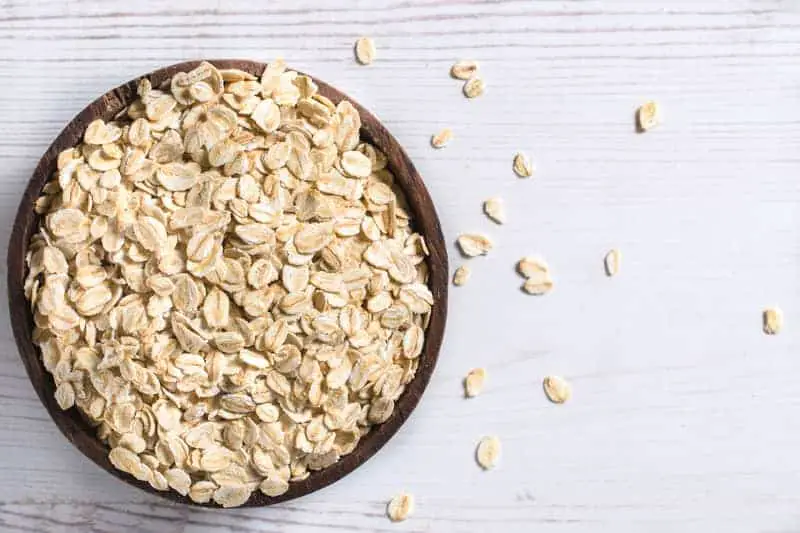Now, I’m not saying here that raw vegan diets are superior to vegan diets that include cooked foods. I personally don’t follow a raw diet, but only because I enjoy cooked food—not because I think this way of eating is healthy. Nearly every way of eating has some benefits and some drawbacks.
But, here I’m going to talk about the benefits of eating a raw vegan diet. People often focus on the shortcomings of raw vegan diets without giving due credit to the ways in which it really shines compared to other ways of eating.
And that’s understandable. If there are ten ways of messing up a vegan diet, there must be a million ways to mess up the raw only version of it.
Another quick note – with some of this stuff you might think: “these benefits have more to do with fruit and vegetable consumption. I don’t see how it has anything to do with being a raw vegan.”
But keep in mind, that the definition of raw vegan diets varies in the raw food community. According to Messina et al, of The Dietitian’s Guide to Vegetarian Diets, adherents of raw vegan diets may consume anywhere between 50% to 100% of their food in the raw state.16
So, it basically means you make a point to eat most, if not all of your food in the raw state. So, in this article, I try to lay out the benefits one can get by eating this way.
1. Raw Vegan Diets Shut the Door to Junk Food
This is perhaps the biggest advantage on a practical level. I’ll explain…
The Three Types of Nutrient-Related Problems
You can think of potential nutrition-related problems as falling into three broad categories:
Under Nutrition
Ways of eating that pose a risk of acute deficiency disease. This category mostly has to do with essential micronutrients.
Over Nutrition
Ways of eating that pose a risk of long-term chronic disease. This has more to do with excess energy and high levels of deleterious food components—food components that are harmful in large quantities (sugar, saturated fat, etc.), or in any quantity (trans fat).
Lack of Protective Substances
Lack of fiber, antioxidants, and phytonutrients found in plant foods that are thought to be protective of a range of metabolic disorders and diseases.
Now, of course, this is a huge generalization, and the above three do overlap. For example, there’s a theory of long-latency deficiency disease that gives a few mechanisms as to how a long-term deficiency of micronutrients may actually play a role in the etiology of chronic diseases.
But, you get the idea.
Relevance to Raw Vegan Diets
- For the most part, raw vegan diets knock it out of the park when it comes addressing numbers 2 and 3. Because raw vegan diets shut the door to highly processed foods, they include TONS of whole-plant foods in their stead. And that’s the hard part—most people don’t get anywhere near even the measly USDA recommendations. Getting micronutrients is easy. Which brings me to the next point.
- Number one is an easy fix. Back in the olden days prior to multivitamin/mineral supplements, our ancestors couldn’t just pop a pill and have all their micronutrient deficiencies vanish (it can get more complicated with malabsorption, etc. but that’s an article for another time). These days, we have little miracle pills available, and there are even vegan versions to boot.
Why Are Some Adherents Reluctant When It Comes to Supplementing?
I’m not sure why this doesn’t get emphasized more. Almost every objection you could throw at raw vegan diets could be completely negated with the simple act of taking a quality vitamin/mineral supplement.
I do have a few ideas…
- For one thing, you’ll often encounter the objection that a multivitamin doesn’t accomplish anything. While it’s true that if you took a population and examined the life expectancy of those taking multivitamins vs. those who don’t, you may not find a big difference if any. That’s because there are so many other factors that determine life expectancy. But they do address specific nutrient deficiencies. If you have symptoms of scurvy and take a vitamin C pill, it will take care of the vitamin C deficiency giving rise to the scurvy.
- I don’t mean to overgeneralize, but it could be that folks who are attracted to this way of eating are a bit more wary of taking supplements than the average vegan. Maybe they want to avoid all things processed. But, whatever the reason just keep in mind that a raw vegan diet implemented with sufficient variety, or one including a daily multivitamin make this way of eating perfectly healthy. And as you’ll see it even has an edge in some areas compared to other eating patterns.
A Double Standard in the Vegan Community?
A lot of vegans will say that a raw vegan diet is unhealthy citing frank nutrient deficiency risk. But they know full well that in order for them to follow a standard vegan diet, they have to supplement with vitamin B12 and usually vitamin D.
However, when you become a raw vegan and need your diet fortified with a few more nutrients, all of a sudden supplementation just doesn’t suffice.
Anyway, that concludes the sermon for today.
2. Potentially Lower Serum LDL Levels
One study looking at the long-term effects of raw food diets found that out of the hundreds of participants, only 1% had total cholesterol (TC) levels classified as high. Further, only 2% had LDL levels on the high side.
This is pretty impressive given that the only inclusion criteria was that participants eat >70% of their food in the raw state. I.e. they were not selected for having any particular profile. Researchers just went out and found a bunch of people eating primarily raw food and found all of them to have TC and LDL in the healthy range.1
3. Potentially Lower Levels of Triglycerides
In the above study, none of the participants—not one—had elevated triglycerides.
So, lower TGs and LDL. Not bad.
This kind of goes to the point above. This group wasn’t selected for being vegan. They were at the very least eating >70% raw food, and following some variation of a vegetarian diet. Yet because their diet precludes so much junk food, and includes so much whole plant food, the end result in many respects is good.1
I should note that in this study, HDL was a bit low here. However, there was not much in the way of mechanistic explanations for it.
4. Higher Nutrient Density
Foods in their raw state maintain more of their nutrients before being consumed.
The typical answer to this talking point is that the nutrients in raw plant foods are less bioavailable, depending on the specific plant. After all, water-soluble nutrients such as vitamin C and B vitamins are especially susceptible to heat degradation.2-4
Raw food vegans have been known to have lower levels of certain micronutrients. Many people automatically attribute this to the plant foods lacking heat exposure which breaks down the cell walls releasing the nutrients.
While this undoubtedly has an effect, keep in mind that raw vegans tend to be lower in fat-soluble vitamins specifically—vitamins A, E, K, and D. And since raw vegans are known for consuming very little fat, it would make sense that some of the deficiencies could be attributed to lack of fat intake or poor timing of fat intake with the intake of fat-soluble vitamins.1 I.e. a handful of nuts with those greens could go a long way in raising levels of some of the key vitamins.
It should be noted that cooking does increase the bioavailability of some antioxidant nutrients.5-7 For instance, cooking tomatoes actually enhance the bioavailability of certain nutrients such as lycopene.8,9
5. Lower Caloric Density
Now, I’m not saying this is always a good thing. Some people don’t need to lose weight. But most people would consider it a good thing to know that their diet made it difficult not to lose weight, at least initially.

Diets composed largely of raw foods can make it difficult at first to ensure sufficient calories for weight maintenance. According to one study, a 100% raw diet was shown to cause 9% weight loss inside of 3 months despite what was supposed to be adequate caloric intake on paper.10-12
6. Protection Against Vascular Disease
One study looked at the dietary habits and mortality among 11,000 vegetarians and health-minded people. What they found was that daily consumption of fresh fruit was associated with a reduced mortality from cerebrovascular disease, ischaemic heart disease, and all cause mortality.
Also, daily consumption of a raw salad seems to provide protection against ischemic heart disease.13 Raw food eaters are known for eating tons of fresh fruit. And while the few I’ve known tend to emphasize bananas, I noticed they really consumed a huge variety of fruit.
7. Raw Vegan Diets May Improve Mood
Higher intakes of fruits and vegetables have been linked with better mental health, raw or cooked. Some researchers wondered whether or not the cooking process may affect this potential benefit, as cooking (and processing in general) may reduce the bioavailability of important nutrients.
So they set out to investigate the differential associations between intakes of processed fruits and veggies, compared to raw fruits and veggies, in terms of mental health outcomes.14 To do this they assessed typical intakes and parameters of mental health in a cross-section young adults.
As far as mental health, they looked at depressive symptoms (anxiety, negative emotion, positive emotion, life satisfaction, and flourishing), as well as covariates (socio-economic status, BMI, sleep, smoking, alcohol use, and physical activity).
What they found was that raw fruit and vegetable intake, but not processed fruit and veggie intake, significantly predicted superior mental health outcomes when they controlled for the covariates.
8. Potential Decreased Risk of Epithelial Cancers
One recent review looked at 206 human epidemiologic studies and concluded that fruits and vegetables were effective in the prevention of several epithelial cancers—forms of cancer involving epithelial cells. For example, benefits were found for cancers of the stomach, esophagus, oral cavity, pharynx, and colon.15
Some of the studies analyzed were cohort and others were case-control.
Of the reviewed studies, the cohort studies (the most robust of this type) indicated fruit and vegetable consumption to be protective against lung cancer specifically.
Of the case-control studies, 174 were found a protective role for fruits and vegetables against many forms of cancer, including lung, esophagus, stomach, the oral cavity, and pharynx, colon, bladder, pancreas, and breast.
So, you might be thinking: “yeah, that’s just fruit and vegetable intake. What’s that have to do with raw vegan diets?”
For one thing, fruits are normally consumed raw. And raw vegans eat lots of fruit.
Secondly, for the specific cancers mentioned, the associated benefit of fruit and vegetable consumption on cancer risk appeared to be from the consumption of raw vegetables.15
Anyway, that pretty much wraps it up for now. Not to say that this article exhausts the benefits of eating raw vegan diet, but that’s what comes to mind for now.
References
- Koebnick C, Garcia AL, Dagnelie PC, et al. Long-term consumption of raw food diet is associated with favorable serum LDL cholesterol and triglycerides but also with elevated plasma homocystein and low serum HDL cholesterol in humans. J Nutr. 2005;135:2372-2378.
- Nicoli M., Anese M., Parpinel M. (1999). Influence of processing on the antioxidant properties of fruit and vegetables. Trends Food Sci. Technol. 10, 94–100. 10.1016/S0924-2244(99)00023-0
- Lee S. K., Kader A. A. (2000). Preharvest and postharvest factors influencing vitamin C content of horticultural crops. Postharvest Biol. Technol. 20, 207–220. 10.1016/S0925-5214(00)00133-2
- Rickman J. C., Barrett D. M., Bruhn C. M. (2007a). Nutritional comparison of fresh, frozen, and canned fruits and vegetables. Part I. Vitamins C and B and phenolic compounds. J. Sci. Food Agric. 87, 930–944. 10.1002/jsfa.2825
- Dewanto V., Wu X., Adom K. K., Liu R. H. (2002). Thermal processing enhances the nutritional value of tomatoes by increasing total antioxidant activity. J. Agric. Food Chem. 50, 3010–3014. 10.1021/jf0115589
- Turkmen N., Sari F., Velioglu Y. S. (2005). The effect of cooking methods on total phenolics and antioxidant activity of selected green vegetables. Food Chem. 93, 713–718. 10.1016/j.foodchem.2004.12.038
- Miglio C., Chiavaro E., Visconti A., Fogliano V., Pellegrini N. (2008). Effects of different cooking methods on nutritional and physicochemical characteristics of selected vegetables. J. Agric. Food Chem. 56, 139–147. 10.1021/jf072304b
- Vallejo F., Tomás-Barberán F., Garcia-Viguera C. (2002). Glucosinolates and vitamin c content in edible parts of broccoli florets after domestic cooking. Eur. Food Res. Technol. 215, 310–316. 10.1007/s00217-002-0560-8
- Yuan G.-F., Sun B., Yuan J., Wang Q.-M. (2009). Effects of different cooking methods on health-promoting compounds of broccoli. J. Zhejiang Univ. Sci. B 10, 580–588. 10.1631/jzus.B0920051
- Rauma, A.L., Nenonen, M., Helve, T., and Hanninen, O. Effect of a strict vegan diet on energy and nutrient intakes by Finnish rheumatoid patients. Eur. J. Clin. Nutr., 47, 747, 1993.
- How is this possible? Poor macronutrient absorption. Data on this suggests that raw food diets may lead to less absorption of macronutrients (the nutrients having calories!), and thus weight loss.
- Rauma, A.L., Nenonen, M., Helve, T., and Hanninen, O. Effect of a strict vegan diet on energy and nutrient intakes by Finnish rheumatoid patients. Eur. J. Clin. Nutr., 47, 747, 1993.
- Key, T.J.A., Thorogood, M., Appleby, P.N., and Burr, M.I. Dietary habits and mortality in 11,000 vegetarians and health conscious people: results of a 17- year follow up. BMJ, 313, 775, 1996.
- Kate L. Brookie, Georgia I. Best, and Tamlin S. Conner. Intake of Raw Fruits and Vegetables Is Associated With Better Mental Health Than Intake of Processed Fruits and Vegetables. Front Psychol. 2018; 9: 487.
- Steinmetz, K. and Potter, J.D. Vegetables, fruit, and cancer prevention: A review. J. Am Dietetic Assoc., 96:1027-1039, 1996.
- Mangels R, Messina V, Messina M. The Dietitian’s Guide to Vegetarian Diets: Issues and Applications. Jones & Bartlett Learning, 3 ed. 2010.

